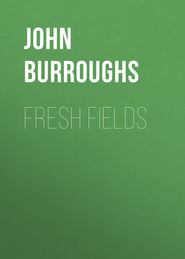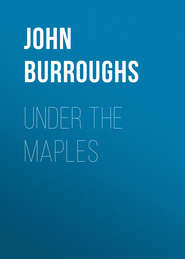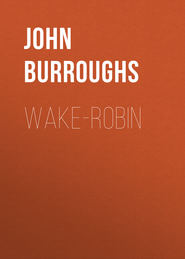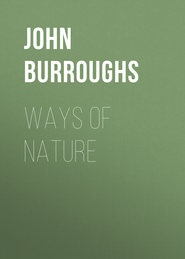По всем вопросам обращайтесь на: info@litportal.ru
(©) 2003-2024.
✖
Bird Stories from Burroughs
Настройки чтения
Размер шрифта
Высота строк
Поля
Claim thy tithings right and left,
I shall never call it theft.
Nature wisely made the law,
And I fail to find a flaw
In thy title to the earth,
And all it holds of any worth.
I like thy self-complacent air,
I like thy ways so free from care,
Thy landlord stroll about my fields,
Quickly noting what each yields;
Thy courtly mien and bearing bold,
As if thy claim were bought with gold;
Thy floating shape against the sky,
When days are calm and clouds are high;
Thy thrifty flight ere rise of sun,
Thy homing clans when day is done.
Hues protective are not thine,
So sleek thy coat each quill doth shine.
Diamond black to end of toe,
Thy counterpoint the crystal snow.
II
Never plaintive nor appealing,
Quite at home when thou art stealing,
Always groomed to tip of feather,
Calm and trim in every weather,
Morn till night my woods policing,
Every sound thy watch increasing.
Hawk and owl in tree-top hiding
Feel the shame of thy deriding.
Naught escapes thy observation,
None but dread thy accusation.
III
Hunters, prowlers, woodland lovers
Vainly seek the leafy covers.
Noisy, scheming, and predacious,
With demeanor almost gracious,
Dowered with leisure, void of hurry,
Void of fuss and void of worry,
Friendly bandit, Robin Hood,
Judge and jury of the wood,
Or Captain Kidd of sable quill,
Hiding treasures in the hill,
Nature made thee for each season,
Gave thee wit for ample reason,
Good crow wit that's always burnished
Like the coat her care has furnished.
May thy numbers ne'er diminish!
I'll befriend thee till life's finish.
May I never cease to meet thee!
May I never have to eat thee!
And mayest thou never have to fare so
That thou playest the part of scarecrow!
THE NORTHERN SHRIKE
Usually the character of a bird of prey is well defined; there is no mistaking him. His claws, his beak, his head, his wings, in fact his whole build, point to the fact that he subsists upon live creatures; he is armed to catch them and to slay them. Every bird knows a hawk and knows him from the start, and is on the lookout for him. The hawk takes life, but he does it to maintain his own, and it is a public and universally known fact. Nature has sent him abroad in that character, and has advised all creatures of it. Not so with the shrike; here she has concealed the character of a murderer under a form as innocent as that of the robin. Feet, wings, tail, color, head, and general form and size are all those of a song-bird, – very much like that master songster, the mockingbird, – yet this bird is a regular Bluebeard among its kind. Its only characteristic feature is its beak, the upper mandible having two sharp processes and a sharp hooked point. It usually impales its victim upon a thorn, or thrusts it in the fork of a limb. For the most part, however, its food seems to consist of insects, – spiders, grasshoppers, beetles, etc. It is the assassin of the small birds, whom it often destroys in pure wantonness, or merely to sup on their brains, as the Gaucho slaughters a wild cow or bull for its tongue. It is a wolf in sheep's clothing. Apparently its victims are unacquainted with its true character and allow it to approach them, when the fatal blow is given. I saw an illustration of this the other day. A large number of goldfinches in their fall plumage, together with snowbirds and sparrows, were feeding and chattering in some low bushes back of the barn. I had paused by the fence and was peeping through at them, hoping to get a glimpse of that rare sparrow, the white-crowned. Presently I heard a rustling among the dry leaves as if some larger bird were also among them. Then I heard one of the goldfinches cry out as if in distress, when the whole flock of them started up in alarm, and, circling around, settled in the tops of the larger trees. I continued my scrutiny of the bushes, when I saw a large bird, with some object in its beak, hopping along on a low branch near the ground. It disappeared from my sight for a few moments, then came up through the undergrowth into the top of a young maple where some of the finches had alighted, and I beheld the shrike. The little birds avoided him and flew about the tree, their pursuer following them with the motions of his head and body as if he would fain arrest them by his murderous gaze. The birds did not utter the cry or make the demonstration of alarm they usually do on the appearance of a hawk, but chirruped and called and flew about in a half wondering, half bewildered manner. As they flew farther along the line of trees the shrike followed them as if bent on further captures. I then made my way around to see what the shrike had caught, and what he had done with his prey. As I approached the bushes I saw the shrike hastening back. I read his intentions at once. Seeing my movements, he had returned for his game. But I was too quick for him, and he got up out of the brush and flew away from the locality. On some twigs in the thickest part of the bushes I found his victim, – a goldfinch. It was not impaled upon a thorn, but was carefully disposed upon some horizontal twigs, – laid upon the shelf, so to speak. It was as warm as in life, and its plumage was unruffled. On examining it I found a large bruise or break in the skin on the back of the neck, at the base of the skull. Here the bandit had no doubt gripped the bird with his strong beak. The shrike's bloodthirstiness was seen in the fact that he did not stop to devour his prey, but went in quest of more, as if opening a market of goldfinches. The thicket was his shambles, and if not interrupted, he might have had a fine display of titbits in a short time.
The shrike is called a butcher from his habit of sticking his meat upon hooks and points; further than that, he is a butcher because he devours but a trifle of what he slays.
THE SCREECH OWL
At one point in the grayest, most shaggy part of the woods, I come suddenly upon a brood of screech owls, full grown, sitting together upon a dry, moss-draped limb, but a few feet from the ground. I pause within four or five yards of them and am looking about me, when my eye lights upon these gray, motionless figures. They sit perfectly upright, some with their backs and some with their breasts toward me, but every head turned squarely in my direction. Their eyes are closed to a mere black line; through this crack they are watching me, evidently thinking themselves unobserved. The spectacle is weird and grotesque, and suggests something impish and uncanny. It is a new effect, the night side of the woods by daylight. After observing them a moment I take a single step toward them, when, quick as thought, their eyes fly wide open, their attitude is changed, they bend, some this way, some that, and, instinct with life and motion, stare wildly around them. Another step, and they all take flight but one, which stoops low on the branch, and with the look of a frightened cat regards me for a few seconds over its shoulder. They fly swiftly and softly, and disperse through the trees.
A winter neighbor of mine, in whom I am interested, and who perhaps lends me his support after his kind, is a little red owl, whose retreat is in the heart of an old apple-tree just over the fence. Where he keeps himself in spring and summer, I do not know, but late every fall, and at intervals all winter, his hiding-place is discovered by the jays and nuthatches, and proclaimed from the tree-tops for the space of half an hour or so, with all the powers of voice they can command. Four times during one winter they called me out to behold this little ogre feigning sleep in his den, sometimes in one apple-tree, sometimes in another. Whenever I heard their cries, I knew my neighbor was being berated. The birds would take turns at looking in upon him, and uttering their alarm-notes. Every jay within hearing would come to the spot, and at once approach the hole in the trunk or limb, and with a kind of breathless eagerness and excitement take a peep at the owl, and then join the outcry. When I approached they would hastily take a final look, and then withdraw and regard my movements intently. After accustoming my eye to the faint light of the cavity for a few moments, I could usually make out the owl at the bottom feigning sleep. Feigning, I say, because this is what he really did, as I first discovered one day when I cut into his retreat with the axe. The loud blows and the falling chips did not disturb him at all. When I reached in a stick and pulled him over on his side, leaving one of his wings spread out, he made no attempt to recover himself, but lay among the chips and fragments of decayed wood, like a part of themselves. Indeed, it took a sharp eye to distinguish him. Not till I had pulled him forth by one wing, rather rudely, did he abandon his trick of simulated sleep or death. Then, like a detected pickpocket, he was suddenly transformed into another creature. His eyes flew wide open, his talons clutched my finger, his ears were depressed, and every motion and look said, "Hands off, at your peril." Finding this game did not work, he soon began to "play possum" again. I put a cover over my study wood-box and kept him captive for a week. Look in upon him at any time, night or day, and he was apparently wrapped in the profoundest slumber; but the live mice which I put into his box from time to time found his sleep was easily broken; there would be a sudden rustle in the box, a faint squeak, and then silence. After a week of captivity I gave him his freedom in the full sunshine; no trouble for him to see which way and where to go.
Just at dusk in the winter nights, I often hear his soft bur-r-r-r, very pleasing and bell-like. What a furtive, woody sound it is in the winter stillness, so unlike the harsh scream of the hawk! But all the ways of the owl are ways of softness and duskiness. His wings are shod with silence, his plumage is edged with down.
Another owl neighbor of mine, with whom I pass the time of day more frequently than with the last, lives farther away. I pass his castle every night on my way to the post-office, and in winter, if the hour is late enough, am pretty sure to see him standing in his doorway, surveying the passers-by and the landscape through narrow slits in his eyes. For four successive winters now have I observed him. As the twilight begins to deepen, he rises up out of his cavity in the apple-tree, scarcely faster than the moon rises from behind the hill, and sits in the opening, completely framed by its outlines of gray bark and dead wood, and by his protective coloring virtually invisible to every eye that does not know he is there. Probably my own is the only eye that has ever penetrated his secret, and mine never would have done so had I not chanced on one occasion to see him leave his retreat and make a raid upon a shrike that was impaling a shrew-mouse upon a thorn in a neighboring tree, and which I was watching. I was first advised of the owl's presence by seeing him approaching swiftly on silent, level wing. The shrike did not see him till the owl was almost within the branches. He then dropped his game, and darted back into the thick cover, uttering a loud, discordant squawk, as one would say, "Scat! scat! scat!" The owl alighted, and was, perhaps, looking about him for the shrike's impaled game, when I drew near. On seeing me, he reversed his movement precipitately, flew straight back to the old tree, and alighted in the entrance to the cavity. As I approached, he did not so much seem to move as to diminish in size, like an object dwindling in the distance; he depressed his plumage, and, with his eye fixed upon me, began slowly to back and sidle into his retreat till he faded from my sight. The shrike wiped his beak upon the branches, cast an eye down at me and at his lost mouse, and then flew away.
A few nights afterward, as I passed that way, I saw the little owl again sitting in his doorway, waiting for the twilight to deepen, and undisturbed by the passers-by; but when I paused to observe him, he saw that he was discovered, and he slunk back into his den as on the former occasion. Ever since, while going that way, I have been on the lookout for him. Dozens of teams and foot-passengers pass him late in the day, but he regards them not, nor they him. When I come along and pause to salute him, he opens his eyes a little wider, and, appearing to recognize me, quickly shrinks and fades into the background of his door in a very weird and curious manner. When he is not at his outlook, or when he is, it requires the best powers of the eye to decide the point, as the empty cavity itself is almost an exact image of him. If the whole thing had been carefully studied, it could not have answered its purpose better. The owl stands quite perpendicular, presenting a front of light mottled gray; the eyes are closed to a mere slit, the ear-feathers depressed, the beak buried in the plumage, and the whole attitude is one of silent, motionless waiting and observation. If a mouse should be seen crossing the highway, or scudding over any exposed part of the snowy surface in the twilight, the owl would doubtless swoop down upon it. I think the owl has learned to distinguish me from the rest of the passers-by; at least, when I stop before him, and he sees himself observed, he backs down into his den, as I have said, in a very amusing manner.
THE CHICKADEE











